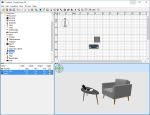- Home
- computer software
- Best Computer Processor
Choosing the best computer processor
Choosing the best computer processor is one of the challenging tasks one can face in computer building and maintenance. When we say the best processor, we are referring to well performing processor which can be measured in efficiency and speed.
Several kinds of computer processors exist on the market today which differs in technology and performance. So, it would be a little complex to pick the right CPU unless you know the features behind each type of processor and the purpose each designed for, since a processor designed for gaming is different from others type of processor.
Who manufactures Microprocessor?
Currently, Intel and AMD (Advanced Micro Devices) dominate the microprocessor industry, where Intel controls most of the PC hardware. We do have computers systems installed with Intel and AMD processors types. Both companies introduced a number of processors which vary in technology and performance.
My work fellows at the office often ask me which brand to pick: a system with Intel or AMD processor. There is no clear cut answer for this; however, before deciding to choose, you should know the type of work you are going to do with the system. This will ease the complication when selecting the best computer processor.
Well, what type of processor is ideal for gaming computer? Do I need high end processor just for sending e-mail, browsing or non-resource intensive applications such as word processing and spread sheet? Which brand to choose: Intel or AMD?
To answer these and related questions, we need to know as much as we can about the features behind each computer processor we are going to choose.
Factors that determine best computer processor
Until now several processors are introduced and installed on both desktop and laptop computers. You can easily know the type of processor installed in your computer by reading the label tag on the computer or use system information found on BIOS setting or Operating system information itself.
Let us go and see the main features related with central processing unit…
Processor clock speed
Processor clock speed measures the computing/execution time of a processor. It is measured in MHz or/and GHz, means million cycles per second or billion cycles per second respectively.
For example, a pc with 2.00 GHz processor is faster than a pc with 1.50GHz processor.
Presently, it becomes more difficult to compare processors based on speed only, but it is an important and basic step to start with. Read more about computer processor here.
Levels of cache
As processor speed is increasing, it is a must to have a type of memory that holds temporary data required by a processor and runs with the same speed or close to the speed of a processor. The main memory couldn’t keep up with the speed of processor.
In order to tackle this bottleneck, cache memory is introduced. Cache memory is a high-speed memory that stores temporary files that are required by the processor. The processor accesses files quickly from this memory type than the main memory.
This will significantly decrease the computing time by the processor and do its job without stopping. Read more about cache memory here.
Currently three levels of cache are installed in current computer system: Level 1 (L1), Level 2(L2) and Level 3(L3). The faster the cache memory, the quicker is the computing time by the processor. So, this is the second feature you need to watch out when choosing the best computer processor.
Hyper-Trading technology
It is a technology first developed by Intel (AMD also has its own technology) which enables a single processor (processor core) to execute two sets of instruction at the same time. This means, a single physical core processor appears as two processors for the operating system.
Hyper-trading technology maximizes the performance of a processor. A processor that incorporates this feature executes a task more quickly.
Specifically, it is recommended for resource demanding programs, running multiple programs simultaneously and multi-threaded applications. Not all processor types support this technology so it is good to see this feature when you buy the best computer processor.
Multi-core processor
Multi-core processor combines two or more processors in a single computer. Physically, it looks a single processor, but it incorporates more than two cores in the inside.
Multi-core processor enables the processors to share the workload between them and increase the processing speed and performance.
“A dual-core processor is like a four-lane highway – it can handle up to twice as many cars as its two-lane predecessor without making each car drive twice as fast.” Source: “Intel Dual-Core processors,” www.intel.com/technology/computing/dual-core
Like the hyper-trading technology, multi-core processors are ideal for multi-threaded applications. You can also do multiple tasks simultaneously on multi-core processor, like burning a CD while running design programs.
Currently, more processor cores are adding to a computer processor. The most common processors are dual-core processors and quad-core processors. Both Intel and AMD have dual and quad-core processors.
Intel or AMD
So far we have covered the core elements that go with the best computer processor. Now, we need to try to answer this question. Which brand to purchase: Intel or AMD?
Well, I have come across with both type of systems, but all my PC’s are installed with Intel processors. Both processors types compete each other in introducing improved and better processors; so it is your decision to choose. Both processor types work fine.
As for me, I choose Intel because Intel not only manufactures microprocessors, it is the largest chipset manufacturer in the world. In order to take the advantages of this, it is good to choose Intel processors. Chipset is an interface between all components of a computer. Actually, AMD is also comes with its own chipsets.
The other fact is that some of AMD processors consume more power than Intel processors.
Intel’s latest processor, Intel Nehalem (Core i) series processors out rank all AMD processors both in efficiency and power consumption. It also incorporates improvements that were not existed in the former processors.
But one thing I must tell that Intel processors are more expensive than AMD.
In summary, if you want to compare computer processors both from Intel and AMD, you may use third party application such as BAPCOSYSmark (www.bapco.com) to compare processors. This application shows you the rank of current and old processors. Based on the rank given on this site, you can easily know the best computer processor.
Conclusion
Generally, when you want to purchase a computer or laptop, one of the main factors that determine the computer performance is the processor. Therefore, it would be useful to remember the above key features when choosing the best computer processor.
I hope that you get something from this article. If you are happy with it share this article to others as well.


